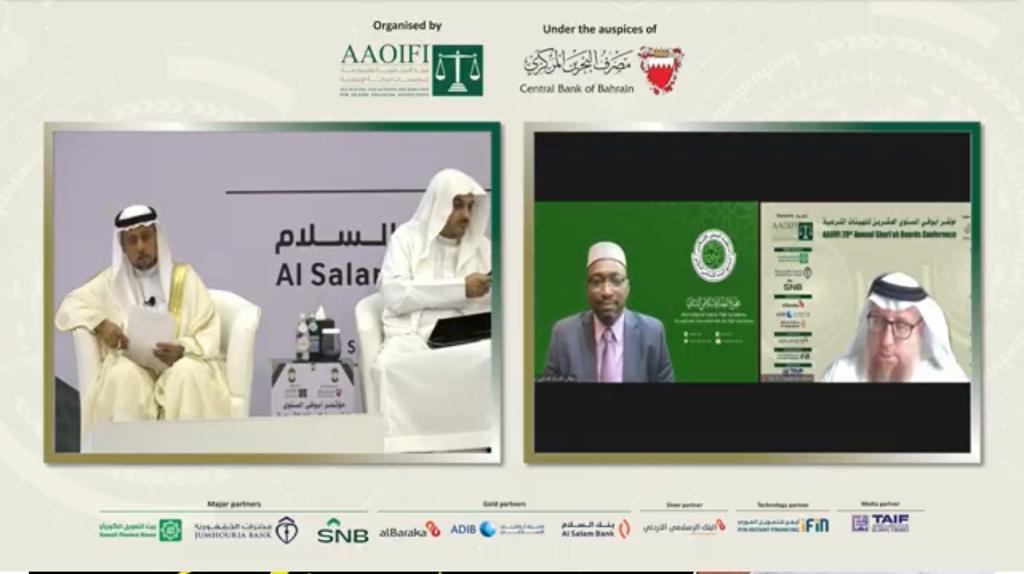
On Monday 15 Shawwal 1443H corresponding to 16 May 2022G, His Excellency Prof. Koutoub Moustapha Sano, Secretary General of the International Islamic Fiqh Academy (IIFA), participated in the 20th Annual Shari’ah Boards Conference of the Accounting and Auditing Organization for Islamic Financial Institutions (AAOIFI) in the Kingdom of Bahrain. The subject of His Excellency’s intervention was the possibility of considering the agent in services or the agent in management as a party that may be obligated to redress the loss on the one hand, and the ruling on the investment agent’s undertaking to purchase investment units and sukuk from the sukuk holders at a specified price on the other hand.
His Excellency began his intervention by defining what is meant by the terms agent in services, agent in management, and agent in investment, where he clarified that the agent in services in modern economy is meant to be in Islamic jurisprudence the agent with wages, and the hireling, as it is meant by the agent in management, the speculator sometimes, and the lessee some other times. As for the agent in investment, it is intended to refer to the speculator on occasions and the business partner on other occasions.
Based on this, His Excellency decided that these three agents, the services agent, the management agent, and the investment agent, may not be obligated to make reparations for the loss or damage of money, and they may not be obligated to guarantee the money they manage unless it is proven that they abused it, or failed to protect it. In other words, these three agents do not guarantee the money that they manage in the event of loss or damage unless they abuse it, or failure in preserving and protecting it, because the agent with a wage is trusted, the hireling is trusted, the speculator is trusted, the business partner is trusted, and there is no guarantee in Shariah on a trustee except in case of abuse or negligence, because the trustee is like the owner of the money, and there is no guarantee on the owner of the money in the event of loss or damage his money. Likewise, there is no guarantee for the trustee except in the case of abuse and negligence.
Then His Excellency clarified that the Shariah rules that dealt with issues and questions of security in Islamic jurisprudence should be preserved and adhered to, and it is not permissible to deviate from them. He also pointed out that these rules are solid and firm, and the most important of which are: The rule of the agent is trustworthy, the rule that there is no guarantee except by infringement, and the rule of fine in case of benefit, the rule of the agent’s hand is a hand of trust, not a hand of guarantee, and the rule of guarantee and wages do not go together. His Excellency also clarified that the failure of the three agents to redress the loss, and not to oblige them to guarantee the money, is considered a preservation of the Shariah purposes in transactions and contracts, especially the purpose of justice between the contracting parties, the purpose of clarity of the pillars and conditions of contracts, and the purpose of the stability and security of rights.
As for the Shariah ruling on the extent to which the investment agent or the management agent may undertake to purchase the investment units or sukuk at the nominal value, the market value, or a specific price, His Excellency made it clear that it is not permissible for the management agent or the investment agent to undertake to purchase those units or sukuk, because their pledge to purchase is inconsistent with the principle of risk, which entails accruing a percentage of the profit in the event of a successful investment according to Shariah. If the risk factor is absent, then the right to profit is negated according to Shariah. In other words, if the agent pledges to invest, it entails converting the investment from being a partnership contract in profit and loss to a loan contract and the borrower must return the money to its owner, whether he wins or loses, and this is contrary to the purpose of justice, which requires the partners to share the profit and loss together, and it is not permissible for only one party to bear the loss.
In conclusion, His Excellency called on those working in Islamic financial institutions to stay away from obligating commitments and promises that contradict Shariah principles and rules, as is the case in this issue. He also called on those interested in the development of the Islamic financial industry to always pay attention to the Shariah purposes in contracts and financial transactions, especially the goals of justice and clarity.
Read Also
Lastest








